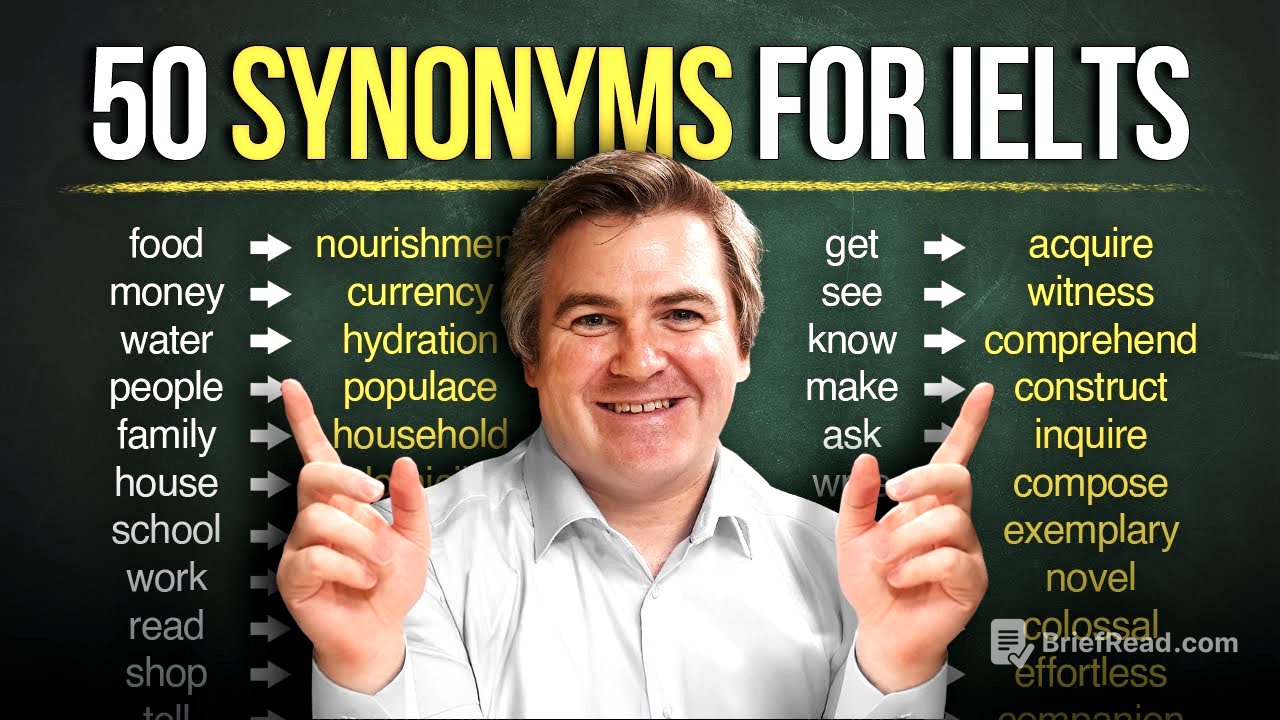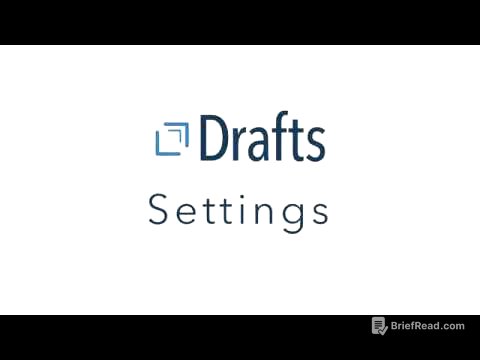TLDR;
This video provides a list of the 50 most common words used in IELTS essays and offers synonyms for each to help test-takers enhance their writing and avoid repetition. It emphasizes the importance of understanding the context and nuances of each synonym to ensure accurate and effective use. The video also warns against simply memorizing lists of words without understanding their meaning and application.
- The video identifies common words such as "people," "important," and "good," and provides alternative vocabulary to use in their place.
- It stresses the importance of understanding the subtle differences in meaning between synonyms to ensure they are used correctly.
- The video also offers a downloadable PDF with all 50 words, their synonyms, and additional advanced vocabulary.
Introduction [0:00]
The video introduces a compilation of the 50 most frequently used words in IELTS band 7, 8, and 9 essays, gathered from VIP students' work. The aim is to provide synonyms for these common words, enabling test-takers to significantly improve their writing scores. A PDF containing all 50 words, their synonyms, and additional vocabulary is available for download.
People [0:26]
The word "people" is very common, but overusing it can make an essay sound basic. Synonyms like "individuals" and "the public" can be used depending on the context. "Individuals" is a direct substitute, while "the public" refers to a collective group.
Important [1:09]
"Important" is often overused, so stronger synonyms can make arguments more persuasive. "Crucial" implies a decisive point for future success, while "vital" suggests something necessary or essential for life or success.
Good [1:48]
"Good" is vague and lacks specificity for academic writing. "Beneficial" clearly states an advantage or help, and "positive" is a direct and academic-sounding alternative.
Develop [2:23]
"Develop" is a versatile verb for progress, growth, or creation. "Cultivate" suggests gradual, careful development, while "foster" implies encouraging something to grow. It's important to consider the specific meanings of synonyms.
Increase [3:17]
"Increase" is essential for describing data and discussing problems or solutions. "Boost" is a stronger, more dynamic word, and "raise" indicates a new initiative to increase investment. Using synonyms shows range, even if they are simple words.
Government [4:46]
"Government" is a key stakeholder in many common topics. "The authorities" is a general term for people in power, and "the state" refers to the governing body of a nation.
Society [5:31]
"Society" is central to essays about social trends, culture, and community issues. "The community" can be used for society in general or a local group, and "the general populace" is a more formal academic term for the population.
Technology [6:23]
"Technology" is a frequent topic in IELTS. "Innovation" focuses on new ideas and inventions, and "digital tools" is more specific when talking about computers, apps, or the internet.
Environment [7:07]
"Environment" is a classic IELTS topic. "The natural world" is a general synonym, "ecosystems" is more scientific, and "the planet" emphasizes a global scale.
Children [7:50]
"Children" is common in topics about education, family, and social development. "Youngsters" is slightly less formal, "the youth" or "young people" refers to the whole group, and "minors" requires correct spelling to avoid confusion.
Students [9:29]
"Students" is essential for essays on education. "Learners" is a broader term emphasizing the act of learning, "pupils" is typically used for school-age children, and "scholars" is for high-achieving or academic students, often at a higher level.
Improve [10:23]
"Improve" is a core verb for suggesting solutions or discussing positive developments. "Enhance" means to intensify or increase the quality of something, and "ameliorate" is a high-level formal word meaning to make something bad better, but it is often misspelled.
Effective [11:36]
"Effective" is used when proposing a solution. "Productive" suggests that it produces the desired results, and "potent" is a very powerful word suggesting a strong deterrent.
Necessary [12:48]
"Necessary" expresses that something is required or must be done. "Essential" means absolutely required, and "imperative" is a stronger, very formal word suggesting urgency.
Different [13:20]
"Different" is useful for making comparisons and contrasts. "Various" is a common and effective synonym, and "diverse" emphasizes a wide range of distinct types.
Work [13:47]
"Work" (noun) is common in discussions about careers and employment. "Employment" is a more formal academic term, and "career" implies a long-term professional journey.
Companies [14:23]
"Companies" is essential for discussing business and the economy. "Corporations" typically refers to larger companies, and "businesses" is a more general term for any commercial organization.
Individual [14:53]
"Individual" (noun) is a formal and academic alternative to "people" or "person." "Person" is used when talking singular, and "citizen" emphasizes the person's role within a society.
Global [15:39]
"Global" is crucial for topics like the environment and economy. "Worldwide" is a direct synonym, and "international" is used when comparing or involving two or more nations.
Modern [16:09]
"Modern" contrasts the present day with the past. "Contemporary" is a more formal academic word, and "present-day" is a clear and effective alternative.
Many [16:38]
"Many" is a common quantifier. "Numerous" and "a large number of" are synonyms that can be used to show range.
Help [17:07]
"Help" is a simple but common verb. "Assist" is a more formal alternative, and "aid" is another formal choice often used with "in" or in noun form.
Provide [17:44]
"Provide" is a strong academic verb for giving or supplying. "Supply" implies fulfilling a need, and "offer" suggests making something available for people to accept or reject.
Believe [18:16]
"Believe" is used for introducing an opinion or argument. "Argue" is stronger and suggests reasons and evidence, and "contend" is more formal for putting forward an argument.
Create [18:48]
"Create" is a powerful verb for making something. "Generate" is often used for jobs, revenue, or electricity, and "establish" implies setting something up on a firm or long-term basis.
Education [19:23]
"Education" is a core IELTS topic. "Schooling" refers more specifically to instruction received at school, and "learning" is a broader concept that includes self-study and experience.
Health [19:57]
"Health" is an extremely common topic. "Well-being" is a broader term including mental and social health, and "physical condition" is more specific to the body.
Family [20:36]
"Family" is a fundamental social unit. "Household" refers to people living in one house, and "domestic unit" is a very formal sociological term for the family and household.
Teachers [21:28]
"Teachers" is essential vocabulary for education. "Educators" is a broader, more formal term, "tutors" teach individuals or small groups outside of school, and "instructors" teach practical skills.
Adults [22:28]
"Adults" is used to discuss people who are no longer children. "Grown-ups" is slightly less formal but widely understood, and "mature individuals" is a formal and respectful way to refer to adults.
Social [23:23]
"Social" describes anything related to society and community. "Communal" relates specifically to community or societal interaction, and "societal" is a very formal adjective relating to society as a whole.
Public [24:02]
"Public" describes services and spaces for everyone. "State-funded" or "state-run" specifies that it is funded and operated by the state, and "civic" relates to the duties of citizens.
Local [25:19]
"Local" specifies a particular area or region. "Community-based" emphasizes that the business is part of and serves the local community, and "neighborhood" relates to a small residential area.
Time [26:14]
"Time" is central to many essays. "Leisure hours" refers specifically to non-work time, and "eras" refers to a distinct period in history.
Life [26:56]
"Life" is a very broad term. "Existence" is a more formal, philosophical term, and "way of living" or "lifestyles" focuses on the manner in which people live.
Experience [27:39]
"Experience" refers to an event or knowledge gained from doing something. "Practical knowledge" highlights the hands-on aspect, and "expertise" implies a high level of skill.
Skills [28:12]
"Skills" is essential for topics on education and employment. "Abilities" is a general synonym, "competencies" is a formal, business-oriented word, and "prowess" means great skill or expertise.
Information [28:53]
"Information" is central to discussing media and technology. "Data" often implies raw facts and figures, and "knowledge" implies a more organized or understood form of information.
Community [29:29]
"Community" refers to a group of people in the same place. "Society" is a broader term referring to people in a country or region, and "populace" is a very formal term for the inhabitants of an area.
Economic [30:02]
"Economic" is crucial for discussing the economy and finance. "Financial" relates to monetary policy, and "monetary" specifically relates to the money of the country.
Personal [30:44]
"Personal" relates to a single individual. "Individual" is a direct and formal synonym, and "private" emphasizes that it is not for public consumption.
National [31:11]
"National" describes something related to an entire nation. "Nationwide" means extending across the entire nation, and "domestic" is used to contrast with foreign or international.
Significant [31:42]
"Significant" is more powerful than "important" or "big." "Substantial" suggests a large amount or size, and "considerable" is another strong word for a large amount.
Possible [32:24]
"Possible" is used to talk about whether something can be done. "Feasible" means possible and practical to do, and "viable" means capable of working successfully, often in a business context.
Available [33:10]
"Available" describes whether a resource can be used or obtained. "Accessible" implies it is easy to get or use, and "obtainable" is a formal word for able to be got.
Successful [33:33]
"Successful" describes the achievement of a desired aim. "Fruitful" means producing good results, and "prosperous" is used especially for financial or business success.
Popular [34:09]
"Popular" means liked or enjoyed by many people. "Widespread" means found over a large area, and "prevalent" means widespread in a particular area or time.
Common [35:06]
"Common" describes something that occurs often. "Widespread" is a synonym, "ubiquitous" means very common, and "frequent" means happening often.
General [36:07]
"General" refers to a whole class of things. "Overall" and "broadly" are synonyms, and "widespread" indicates widespread agreement.
More [36:38]
"More" is used to form comparatives. "Greater" is a more formal and emphatic choice, and "additional" is used to talk about adding to what is already there.
Biggest Mistake [37:17]
The biggest mistake is knowing words but not being able to use them. The video recommends watching another video on how band 8 and 9 students remember and use vocabulary properly.









